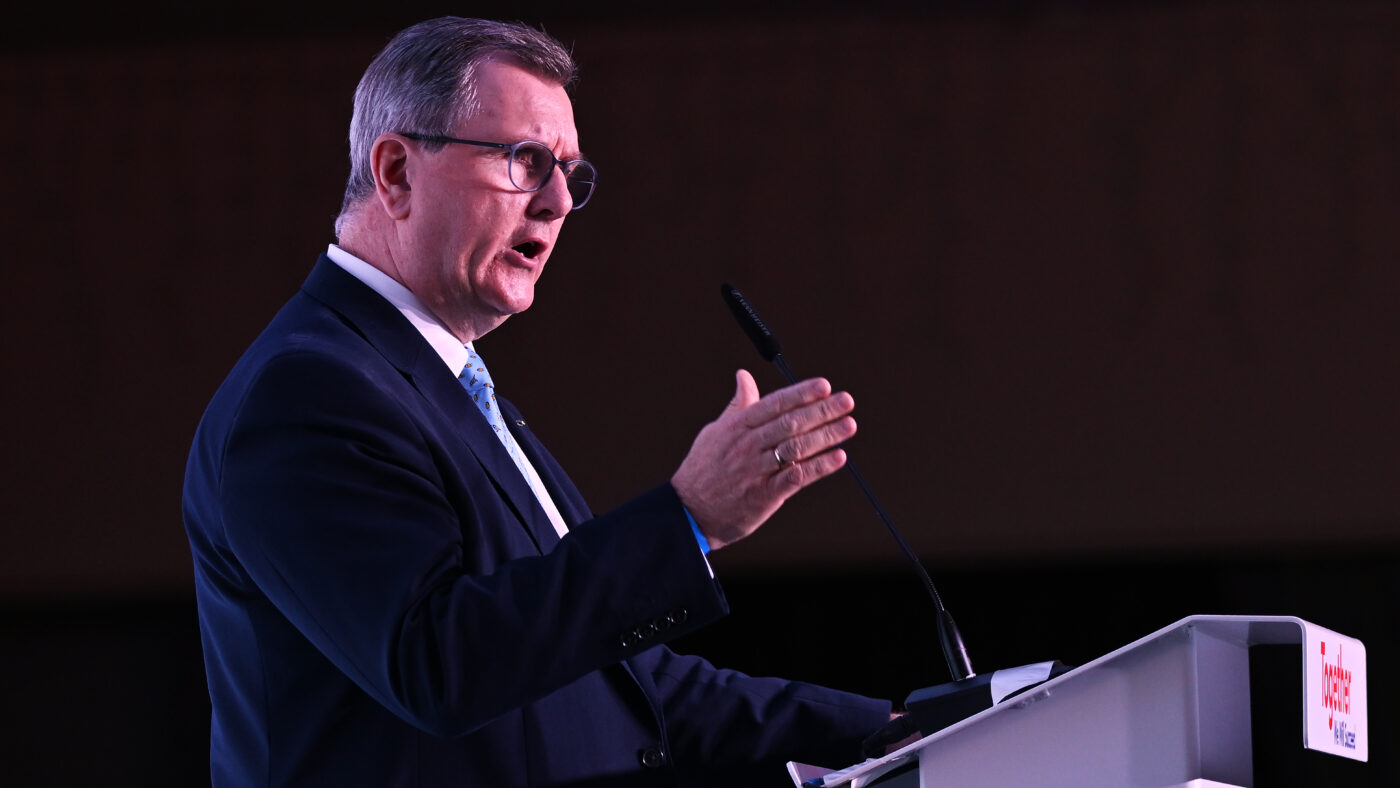In the aftermath of Sir Jeffrey Donaldson’s arrest, Northern Ireland’s political institutions and its largest unionist party face an uncertain future. Last week, the former DUP leader was charged with historical sex offences, causing genuine shock and dismay across the province.
Donaldson resigned from that position immediately and was replaced on an interim basis by his moderate ally, Gavin Robinson MP, whose bid for the permanent party leadership now looks unlikely to be challenged. The Belfast News Letter reported on Wednesday that more traditionalist DUP representatives would concentrate on securing the deputy leader’s role for a figure from their wing of the party.
The power-sharing institutions at Stormont, of course, were only revived in February, by Donaldson’s Safeguarding the Union deal with the Government on the Northern Ireland Protocol/Windsor Framework. The DUP previously refused to participate in the province’s devolved administration for two years, in protest against the Irish Sea border.
To persuade his divided party back into power, Donaldson asserted that prolonging the boycott would damage the Union and convince undecided voters that Northern Ireland was not ‘working’. That was a reasonable argument on its own merits, but, in order to sell his deal, he also made outlandish claims, insisting that Safeguarding the Union removed the Irish Sea border, ended customs checks and stopped an ‘automatic pipeline’ of EU law in the province.
The DUP’s rival, the Ulster Unionist Party (UUP), supported the revival of Stormont, but rejected Donaldson’s suggestion that he had solved the problems with the protocol. Meanwhile, the TUV (Traditional Unionist Voice), which recently unveiled an electoral pact with Reform UK, was more forthright, repeatedly highlighting the continuing effects of the framework, alongside the sarcastic message ‘Thanks Jeffrey’ on social media. After Donaldson’s arrest, the party attacked his deal as ‘tainted’, with its press officer, Sammy Morrison, insisting on X that it was time for unionists to ‘reassess and find reverse gear’.
Even within the DUP, senior figures like the MP Sammy Wilson, and the party’s leader in the House of Lords, Nigel Dodds, have criticised the deal strongly. Mr Wilson resigned as the party’s Chief Whip in the House of Commons because he felt unable to enforce a positive message on Safeguarding the Union that he did not believe.
The member for East Antrim, though, was also quick to appeal for unity within the DUP and across Ulster unionism. He recently rejected the idea that Gavin Robinson should be subjected to a leadership vote before the general election and appealed to unionists to back his party in marginal seats, where nationalists or the constitutionally ‘agnostic’ Alliance Party could benefit from internal disarray.
The potential problem seats for the DUP include Donaldson’s Lagan Valley constituency, where Alliance’s MLA Sorcha Eastwood has built up a high profile. Sir Jeffrey has not yet resigned as an MP, so a by-election is not inevitable, but the party will be under pressure to find a popular candidate as quickly as possible, with a general election imminent.
The DUP’s new leader, Gavin Robinson, is also defending a majority of just 1,800 in his East Belfast constituency. He won that seat in 2015 and defended it on two occasions from Alliance leader, Naomi Long, who is expected to stand again.
The DUP will say that, as the biggest unionist party, any dip in its vote will threaten Northern Ireland’s place in the Union and encourage nationalists in their campaign for a border poll on the province’s constitutional status. Its rivals will claim that the party has led unionism in a chaotic and self-destructive way, with Donaldson’s arrest just the latest example.
From the UUP’s perspective, the DUP antagonised middle-ground voters and undermined confidence in the Stormont institutions through its policies on Brexit and involvement in controversies like the RHI renewable heating scandal. The TUV argues that Donaldson irreparably damaged the Union by effectively accepting a trade border that separates Northern Ireland from the rest of the UK.
Many unionists remain uncomfortable with the DUP sitting alongside a Sinn Fein First Minister who still maintains that the IRA’s campaign of terrorism was necessary.
The party’s former leader argued that accepting this dispensation was necessary for the greater good of the Union. Even after his arrest, Donaldson was still being lauded for that ‘leadership’ by much of the media and government figures, like Julian Smith, who played a key role in negotiations with the DUP. Rishi Sunak yesterday emphasised that Stormont politicians would have his ‘full support’ as they attempted to maintain power-sharing and ‘stability’.
For the time being, the devolved institutions are likely to continue as normal; not least because MLAs will want to keep their full salaries and expense accounts.
Undoubtedly, though, the shocking news from the past week will diminish Donaldson’s former supporters in the DUP and shake public faith in a deal that was inextricably linked to his leadership. The forthcoming general election will be critical in determining both the future direction of unionism in Northern Ireland and the fate of devolution at Stormont.
Click here to subscribe to our daily briefing – the best pieces from CapX and across the web.
CapX depends on the generosity of its readers. If you value what we do, please consider making a donation.


